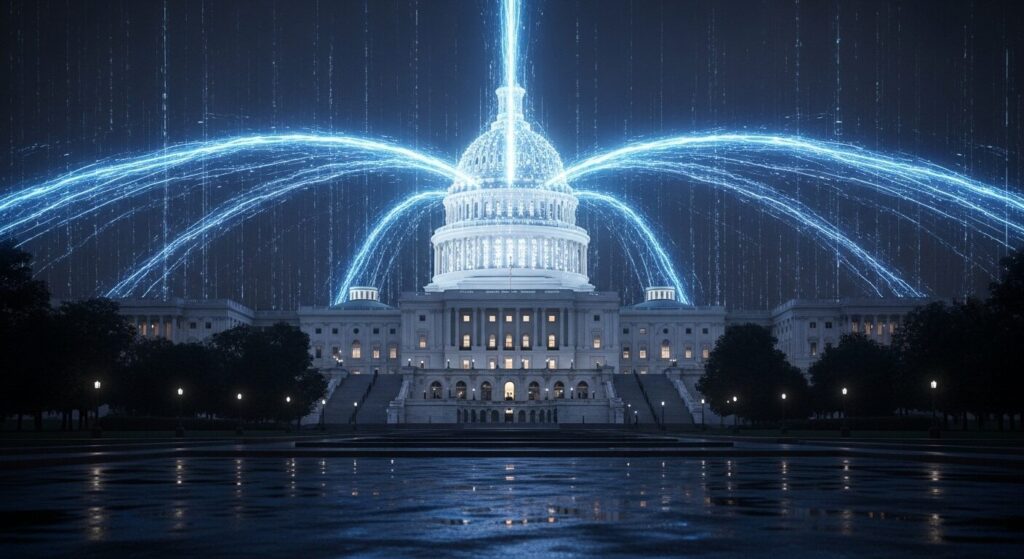The US government’s recent partnership with OpenAI, offering federal agencies access to its advanced AI models for a symbolic $1 for the next year, marks a significant moment in the integration of artificial intelligence into public service. As reported by Wired.com, this agreement is poised to reshape how federal operations function, driving efficiency and innovation across various departments. This move isn’t just about a low price; it represents a strategic commitment to leveraging cutting-edge AI for national benefit, aligning with broader governmental initiatives to accelerate AI adoption.
Accelerating Public Service Modernization
The core objective of this partnership is to modernize public services and enhance operational efficiencies across federal agencies. By providing access to frontier AI models like ChatGPT, the government aims to streamline complex processes, improve data analysis, and potentially revolutionize citizen interaction. Imagine AI-powered tools assisting with constituent inquiries, automating routine administrative tasks, or even aiding in complex research for policy development. The General Services Administration (GSA) has been proactive in this push, adding not only OpenAI’s ChatGPT but also Anthropic’s Claude and Google’s Gemini to its federal purchasing list. This inclusive approach signals a commitment to exploring diverse AI capabilities available in the market, ensuring agencies have a range of powerful tools at their disposal to serve the American public more effectively.
Navigating the AI Action Plan and Procurement Landscape
This strategic integration of AI is deeply rooted in the Trump administration’s Winning the Race: America’s AI Action Plan, unveiled in July 2025. This comprehensive plan outlines over 90 policy actions across three critical pillars: accelerating innovation, building robust American AI infrastructure, and solidifying global leadership in AI diplomacy and security. The GSA’s updated procurement guidelines are a direct reflection of this plan, emphasizing that federally acquired AI models must adhere to principles of “objective truth” and remain “free from top-down ideological bias.” This focus on neutrality and factual accuracy is crucial for government applications, where impartiality and reliability are paramount.
For AI developers like OpenAI, Anthropic, and Google, meeting these stringent procurement standards for transparency, explainability, and security will be key to securing future federal contracts. The government is also actively encouraging the use and export of open-weight AI models, particularly for allied nations. While this fosters collaboration and innovation, it comes with a strong emphasis on robust security and intellectual property protections to prevent misuse or adversarial exploitation. The partnership with OpenAI, which recently released its own open-weight models, could facilitate collaborations with agencies requiring enhanced data security and customization capabilities.
Addressing the Challenges: Security, Bias, and Workforce
While the potential benefits of AI in government are vast, the path to widespread adoption is not without its hurdles. Security remains a paramount concern. Integrating advanced AI into sensitive government systems necessitates rigorous safeguards against cyber threats, data breaches, and potential misuse. Agencies like the Department of Homeland Security (DHS) are leading initiatives in cybersecurity and AI governance, including the establishment of a new AI Information Sharing and Analysis Center (AI-ISAC). Furthermore, continuous updates to the National Institute of Standards and Technology’s (NIST) AI Risk Management Framework (AI RMF) are essential to address evolving threats, as detailed in discussions around AI safety and government reports. The ongoing threat of zero-click vulnerabilities in AI connectors, for instance, underscores the need for constant vigilance and robust incident response protocols.
Beyond security, the challenge of ensuring AI models are free from bias and operate with ideological neutrality is critical for public trust. The government’s emphasis on “truth-seeking” capabilities reflects a proactive stance against the propagation of misinformation or skewed outcomes. Finally, a significant challenge lies in developing a skilled workforce capable of deploying, managing, and maintaining these advanced AI systems. Investing in AI education and training programs is vital to bridge the talent gap and ensure federal employees can effectively leverage these new tools.
Implications for Business and the Future of Federal AI
This landmark partnership between the US government and OpenAI sends a clear signal to the broader technology industry. It indicates a strong federal appetite for advanced AI solutions, creating significant opportunities for companies that can meet the evolving demands for secure, transparent, and ethically sound AI. The government’s proactive stance, including its aggressive regulatory rollback in some areas and focus on domestic infrastructure buildout, is designed to spur innovation across the private sector. Companies that align with the AI Action Plan‘s goals—particularly in areas like secure AI development, infrastructure support, and adherence to new procurement standards—are likely to find themselves in a favorable position.
This is especially true as new models from companies like OpenAI promise to usher in a new era of AI performance with their latest releases, potentially sparking a price war that benefits adopters. The government is also planning new public-private consortia and Requests for Information (RFIs) to shape future contracting and compliance, inviting industry input and collaboration. This strategic shift suggests that the federal sector is becoming a major driver for AI innovation, pushing for solutions that are not only powerful but also trustworthy and secure. The increasing adoption of AI by even small businesses for growth further highlights the widespread impact and potential of AI across all sectors.
A Calculated Investment in the Future
OpenAI’s $1 deal with the US government is far more than a simple transaction; it’s a calculated investment in the nation’s technological future. It signifies a profound shift towards integrating advanced AI into the very fabric of federal operations, aiming for unprecedented levels of efficiency and service delivery. While the journey will undoubtedly involve navigating complex challenges related to security, ethics, and workforce development, the commitment is clear. This partnership, set against the backdrop of the comprehensive AI Action Plan, positions the US government as a significant force in the global AI landscape, driving innovation and setting new standards for responsible AI deployment in the public sector.



